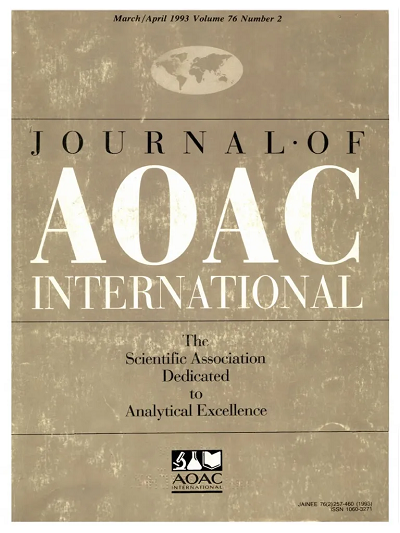Determination of Seven Human Milk Oligosaccharides (HMO) in Infant Formula and Adult Nutritionals: First Action 2022.07
IF 1.7
4区 农林科学
Q3 CHEMISTRY, ANALYTICAL
引用次数: 0
Abstract
Background Human milk oligosaccharides (HMOs) are important components of breast milk and may be responsible for some of the benefits of breastfeeding, including resistance to infections and the development of a healthy gut microbiota. Selected HMOs are now available for addition to infant formula, and suitable methods to control the dosing rate are needed. Objective To develop and validate a suitable method for the analysis of HMOs in infant formula. Method A method was developed for the determination of seven human milk oligosaccharides (2’-fucosyllactose, 3-fucosyllactose, 3’-sialyllactose, 6’-sialyllactose (6’SL), 2’,3-difucosyllactose, lacto-N-tetraose (LNT), lacto-N-neotetraose (LNnT)) in infant formula and adult nutritionals. The oligosaccharides are labelled at their reducing end with 2-aminobenzamide, separated by liquid chromatography and detected using a fluorescence detector. Maltodextrins are enzymatically hydrolyzed before analysis to prevent potential interference, likewise an optional β-galactosidase treatment can be used to remove β-galactooligosaccharides. Fructooligosaccharides or polydextrose do not generally interfere with the analysis. Results The method has been validated in a single laboratory on infant formula and adult nutritionals. The seven HMOs were spiked in to eight matrices at three or four spike levels giving a total of 176 data points. Recoveries were in the range 90.9–109% in all cases except at the lowest spike level in one matrix (elemental formula), where the LNT recovery was 113%, the LNnT recovery was 111% and the 6’SL recovery was 121%. Relative repeatabilities (RSD(r)) were in the range 0.1–4.2%. The performance is generally within the requirements outlined in the Standard Method Performance Requirements (SMPR®) published by AOAC International. Conclusions The method developed is suitable for the determination of seven HMOs in infant formula and demonstrated good performance during single laboratory validation. Highlights A method has been developed which is suitable for the determination of seven HMOs in infant formula.测定婴儿配方奶粉和成人营养品中的七种母乳低聚糖 (HMO):首次行动 2022.07
背景 母乳低聚糖(HMOs)是母乳的重要成分,可能是母乳喂养的一些益处,包括抗感染和健康肠道微生物群的发育。目前,部分 HMO 可添加到婴儿配方奶粉中,但需要合适的方法来控制添加量。目标 开发并验证分析婴儿配方奶粉中 HMOs 的合适方法。方法 建立了一种测定婴儿配方奶粉和成人营养品中七种人乳低聚糖(2'-岩藻酰乳糖、3-岩藻酰乳糖、3'-硅藻酰乳糖、6'-硅藻酰乳糖(6'SL)、2',3-二岩藻酰乳糖、乳-N-四糖(LNT)、乳-N-新四糖(LNnT))的方法。低聚糖的还原端用 2- 氨基苯甲酰胺标记,用液相色谱法分离,并用荧光检测器检测。麦芽糊精在分析前会被酶水解,以防止潜在的干扰,同样,β-半乳糖苷酶处理也可用于去除β-半乳寡糖。果寡糖或聚葡萄糖一般不会干扰分析。结果 该方法已在一家实验室对婴儿配方奶粉和成人营养品进行了验证。在八种基质中添加了三种或四种 HMO,共得到 176 个数据点。除一种基质(元素配方)中最低加标水平的 LNT 回收率为 113%、LNnT 回收率为 111%、6'SL 回收率为 121%外,所有情况下的回收率都在 90.9-109% 之间。相对重复性 (RSD(r)) 在 0.1-4.2% 之间。其性能基本符合 AOAC 国际公布的《标准方法性能要求》(SMPR®)中列出的要求。结论 所开发的方法适用于测定婴儿配方奶粉中的七种 HMOs,并在单一实验室验证过程中表现出良好的性能。要点 已开发出一种适用于测定婴儿配方奶粉中七种 HMOs 的方法。
本文章由计算机程序翻译,如有差异,请以英文原文为准。
求助全文
约1分钟内获得全文
求助全文
来源期刊

Journal of AOAC International
医学-分析化学
CiteScore
3.10
自引率
12.50%
发文量
144
审稿时长
2.7 months
期刊介绍:
The Journal of AOAC INTERNATIONAL publishes the latest in basic and applied research in analytical sciences related to foods, drugs, agriculture, the environment, and more. The Journal is the method researchers'' forum for exchanging information and keeping informed of new technology and techniques pertinent to regulatory agencies and regulated industries.
 求助内容:
求助内容: 应助结果提醒方式:
应助结果提醒方式:


